| | | | | | | Presented By Babbel | | | | Axios World | | By Dave Lawler ·Nov 01, 2021 | | Hello from Glasgow and welcome back to Axios World. - I'll be bringing you coverage of the COP26 climate summit this week. Tonight's edition (1,734 words, 6½ minutes) also includes stops in the Channel Islands, Japan and Sudan.
| | | | | | 1 big thing: India's long road to "net zero" |  Data: Climate Action Tracker; Chart: Will Chase/Axios GLASGOW, Scotland — Indian Prime Minister Narendra Modi's much-anticipated speech today at the COP26 climate summit broke new ground for the world's third-largest emitter, but it won't calm fears that the summit has failed to summon the urgency required to truly change the trajectory of the planet. The big picture: Success or failure in Glasgow will largely be defined by the plans that individual countries bring to the table to limit their emissions this decade and strive toward net zero. - With China's Xi Jinping limiting his participation to a written statement and Russia's Vladimir Putin also staying home, much of the attention shifted to Modi.
Driving the news: India tonight joined all of the world's other big polluters in committing to a "net zero" target date — not 2050 as the U.S. and other rich countries have advocated, or 2060 as China has adopted, but 2070. - That's still notable, considering Modi's environment minister dismissed the idea of net zero pledges just last week. But it's also a half-century away.
- Modi also increased the target for India's renewable energy production by the end of this decade, a crucial piece of the puzzle since India's demand for energy is projected to rise significantly, unlike in many developed countries.
- He argued that to fund such transitions, developed countries must "make $1 trillion available as climate finance as soon as possible."
What he's saying: Modi said he felt a "duty to raise my voice for developing countries." - He noted that rich countries had fallen short of their previous promises, including to provide $100 billion in annual climate financing beginning in 2020.
- At a separate event alongside fellow world leaders, Modi used his time to highlight the help that countries like India need to adapt to the effects of climate change.
Flashback: India used to enter such summits with the attitude of "we have such low per-capita emissions, don't even talk to us because we will never exceed where you are at," says Amar Bhattacharya, former director of the "Group of 24" club of developing countries and now a fellow at Brookings. - Now, Modi's position is that India still needs fossil fuels but is prepared to become a renewables powerhouse if the investment is available, Bhattacharya says. Other big developing countries like Vietnam, which today pledged to reach net zero by 2050, are in a similar boat.
- Yes, but: India seems to be in no hurry to quit coal, which currently accounts for 70% of its energy mix.
What's next: Developed countries produced most of the carbon that's already in the atmosphere, and the developing countries "need space to grow," says Bhattacharya. - That growth doesn't have to be powered by fossil fuels. But that just underscores the urgency of advancing alternative paths in Glasgow.
|     | | | | | | 2. Kerry considers the day after Glasgow | 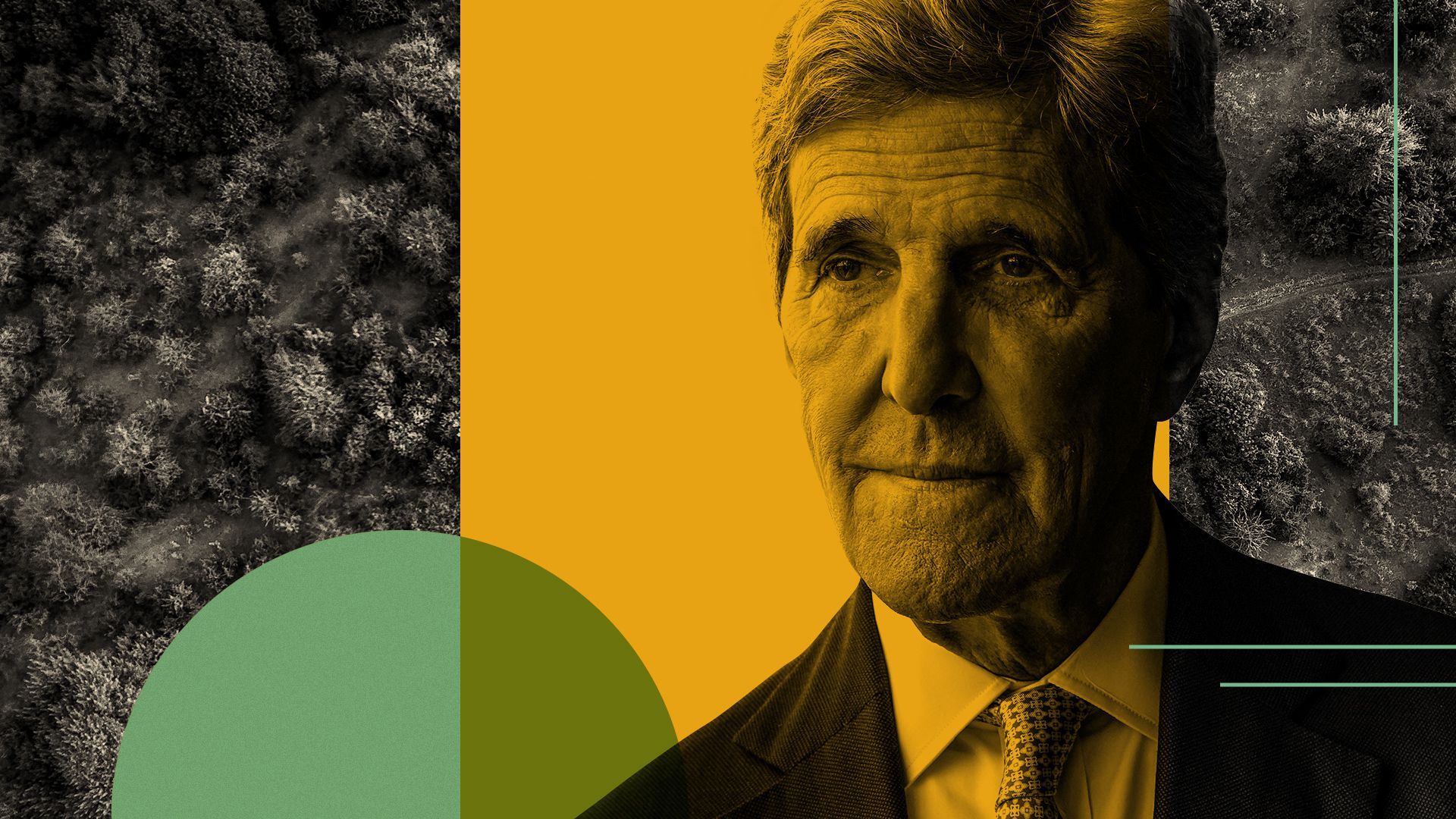 | | | Photo illustration: Aïda Amer/Axios. Photo: Christopher Goodney/Bloomberg via Getty Images | | | | COP26 is barely underway, but U.S. climate envoy John Kerry is also looking ahead to what's next. What he's saying: "What's really critical is making sure whatever promises and whatever ambition is put on the table here is empowered to execute," Kerry told Axios' Ben Geman tonight in Glasgow on the sidelines of the summit. - "That means that countries that have raised their ambition, but which know that they need technical assistance, and finance, have got to get it," Kerry said.
- "And our focus, our primary focus, will be marrying the trillions that will be on the table with the blended finance, the de-risking, the ... development banks, that make deals happen."
Zoom in: Kerry also name-checked a few of the countries and topics he's eyeing further work on, including India's 2030 renewables target, as well as Mexico, Indonesia and South Africa. - "So there's a big agenda, which is going to require a lot of cooperative work. That's the biggest single thing you can do is help the ambition to become real," he said.
- Asked how long he expects to remain special envoy, Kerry said, "I really haven't confronted that, and I haven't taken it on with any specific term in mind." Then he added, "Not forever."
What's next: After President Biden leaves Glasgow tomorrow, Kerry will stay behind to push the negotiations forward. - He kept a frenetic travel schedule over the last several months to set the table for the summit.
- But his biggest request of all — swift action to phase out coal — appears likely to fall short at Glasgow, Axios' Zach Basu and Andrew Freedman report. Go deeper.
|     | | | | | | 3. Key quotes from Glasgow |  Data: BP; Chart: Thomas Oide/Axios Three quotes that caught my attention today in Glasgow. "I guess I shouldn't apologize, but I do apologize for the fact that the United States under the last administration pulled out of the Paris accord. That kind of put us behind the eight ball a bit." — Joe Biden "The central banks of the wealthiest countries engaged in $25 trillion of quantitative easing in the last 13 years. ... Had we used that $25 trillion to purchase bonds to finance the energy transition or the transition of how we eat or how we move ourselves in transport, we would now today be approaching that 1.5-degree limit that is so vital to us." — Barbados Prime Minister Mia Mottley "What will it take for you to listen to us? ... If global temperatures remain unchecked at 1.5 and jump to 2 degrees, that is the death sentence to the Maldives." — Maldives President Ibrahim Mohamed Solih |     | | | | | | A message from Babbel | | Practice speaking a new language with Babbel Live | | |  | | | | Take live online classes with top certified, world-class language teachers and learn real world conversation skills quickly. Choose topics, level, and class time. Get 65% off and start on your shortest path to real conversations with Babbel Live. | | | | | | Bonus: Where in the world |  | | | Screengrab via Apple News. | | | | We're sticking with the theme of cities that shine brightly, this time visiting East Africa. - Thanks to all of you who helped solve the mystery of the bright spot in Venezuela from last time. The most prevalent theory is that it was due to gas flaring.
Scroll to the bottom for the answers. |     | | | | | | 4. Fish wars between U.K. and France | 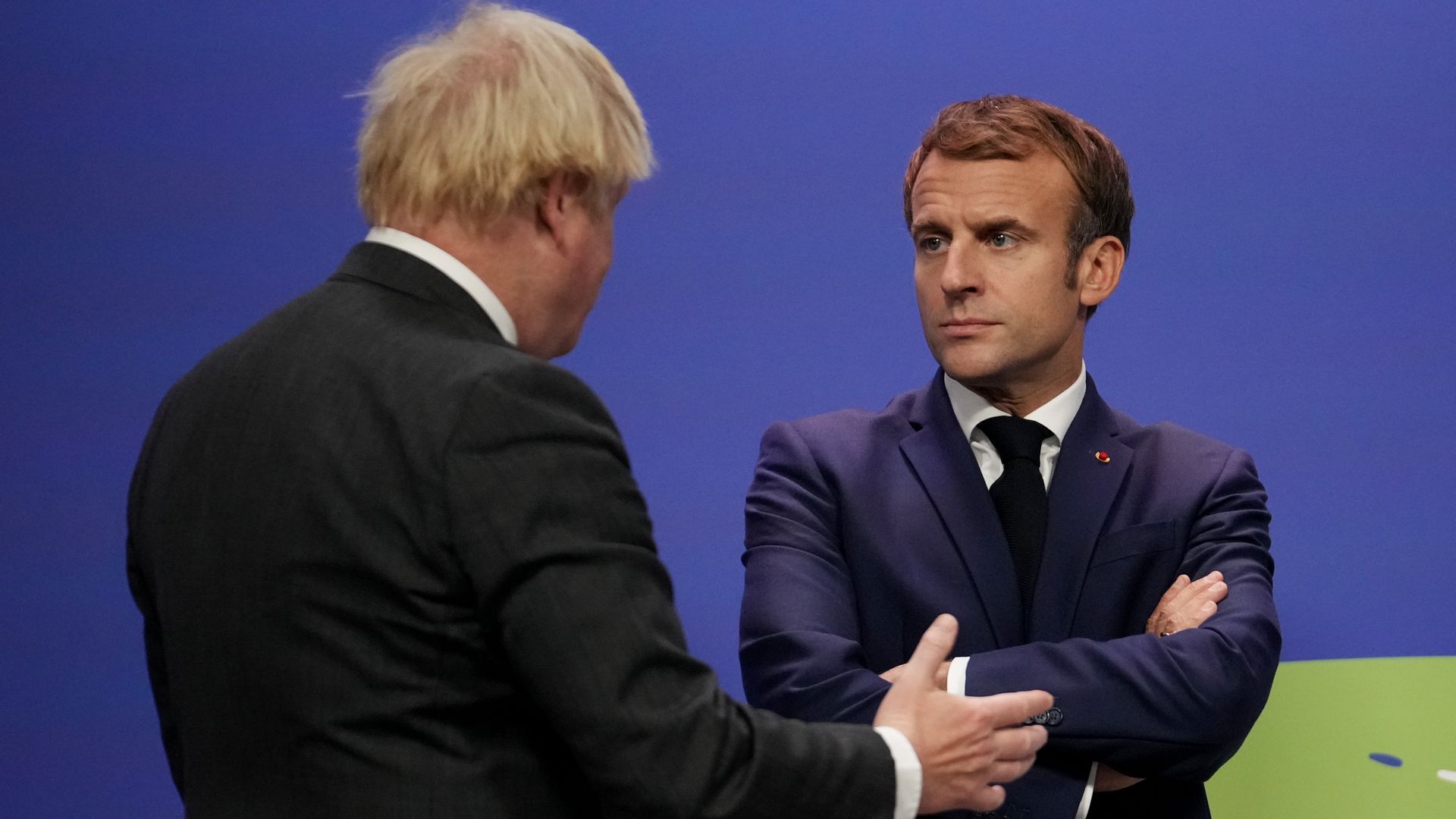 | | | Photo: Christopher Furlong/Getty Images | | | | The U.K. and France are barreling toward a new crisis in their post-Brexit relationship, with each side digging in its heels in a fishing dispute that threatens to erupt into a full-on trade war, Axios' Zach Basu writes. Driving the news: The latest flashpoint comes courtesy of an industry that accounts for just 0.1% of the U.K.'s GDP but has played an outsized role in Brexit Britain's emphasis on "sovereignty" and national pride. - France has accused the U.K. of declining to grant fishing licenses for French boats for political reasons, and it seized a British trawler last week for alleged illegal fishing.
- France is now threatening to bar British boats from ports, impose new border checks, and potentially raise energy prices for the British Channel Islands.
- U.K. Foreign Minister Liz Truss has demanded that the French back down by Tuesday or else face legal action, and she's suggested French President Emmanuel Macron was trying to whip up nationalist support ahead of next year's elections.
The latest: Macron told reporters today at COP26 that sanctions would be delayed as the two sides continue to negotiate past his original midnight deadline. - Johnson and Macron, whose strained relationship is no secret, met on the sidelines of the G20 on Sunday, where each leader claimed the onus was on the other to de-escalate.
- The meeting came one day after a leaked letter from French Prime Minister Jean Castex called on the European Commission to show unity in the fishing dispute to demonstrate that "leaving the EU causes more damage than staying in."
The big picture: Johnson's government has made "Global Britain" — the idea that the U.K. can have a bigger impact on the world stage outside of the EU — the centerpiece of its foreign policy. - But this is the second time that a Brexit-related dispute has threatened to overshadow an international conference hosted by the U.K., after the "sausage war" became a focal point of the G7 summit in Cornwall in June.
- Northern Ireland, meanwhile, remains an intractable puzzle: Masked men hijacked a bus and set it on fire on Monday, reportedly in protest of a missed deadline for renegotiating the Brexit agreement that created a customs border between the territory and the rest of the U.K.
The bottom line: The Brexit debate is here to stay. The U.K. government's fiscal watchdog said last week that leaving the EU will ultimately be worse for the economy than COVID-19. |     | | | | | | 5. Global news roundup | 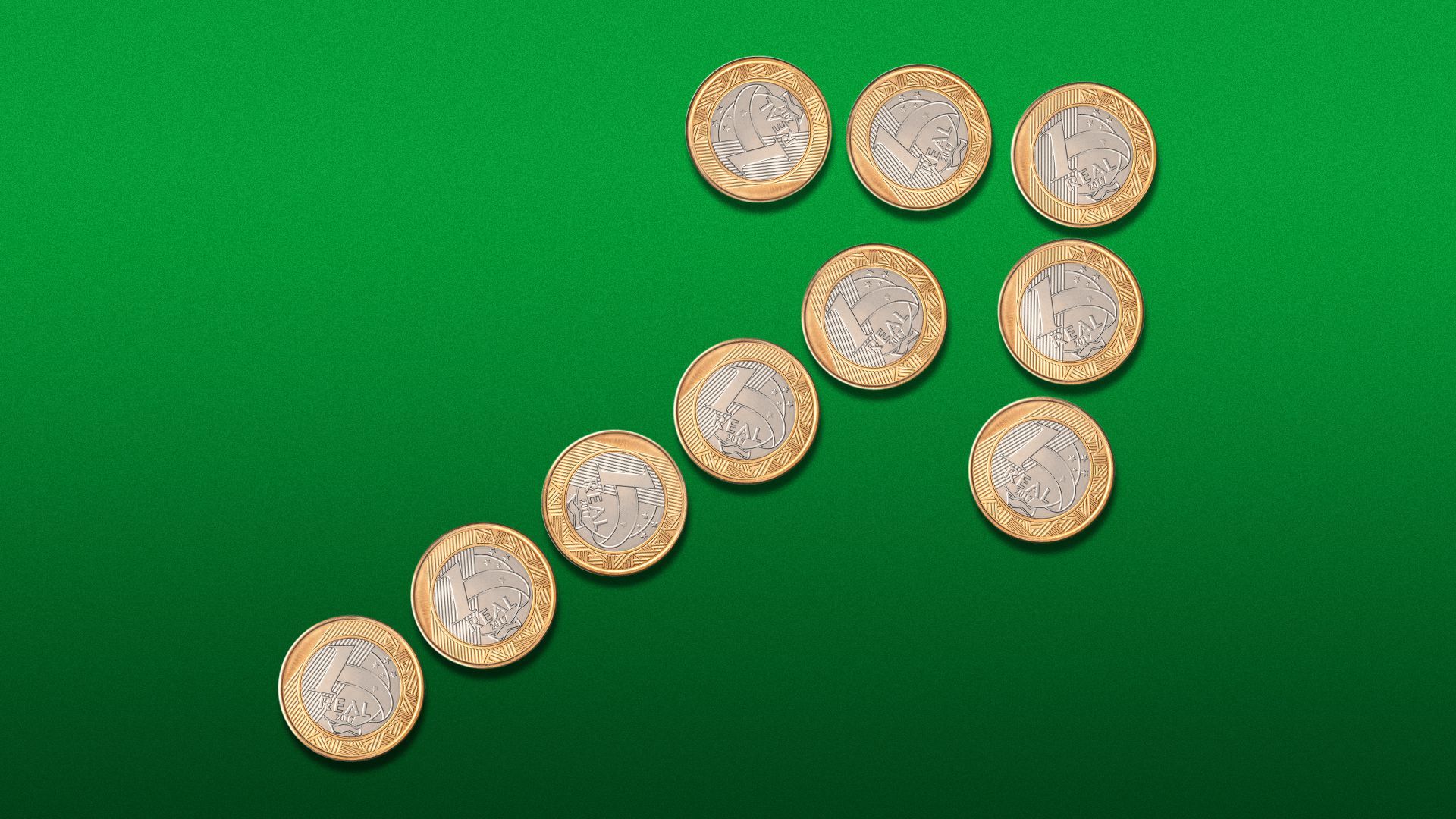 | | | Illustration: Annelise Capossela/Axios | | | | 1. Japan's ruling Liberal Democratic Party, which has held power almost uninterrupted for 65 years, won yet another general election on Sunday. - The race wasn't nearly as close as had been anticipated, and new Prime Minister Fumio Kishida won a solid mandate.
2. Saudi Arabia expelled Lebanon's ambassador and imposed a ban on Lebanese imports after Iran's information minister said Yemen's Houthi rebels were fighting in "self-defense" in the face of Saudi aggression. 3. Wikipedia banned several pro-Beijing moderators, the BBC reports, highlighting the information wars being waged online between the Chinese Communist Party's supporters and critics. 4. Brazil's central bank seems to be losing the fight against runaway inflation, Axios' Kate Marino reports. |     | | | | | | 6. What I'm reading: "The Fugitives" | 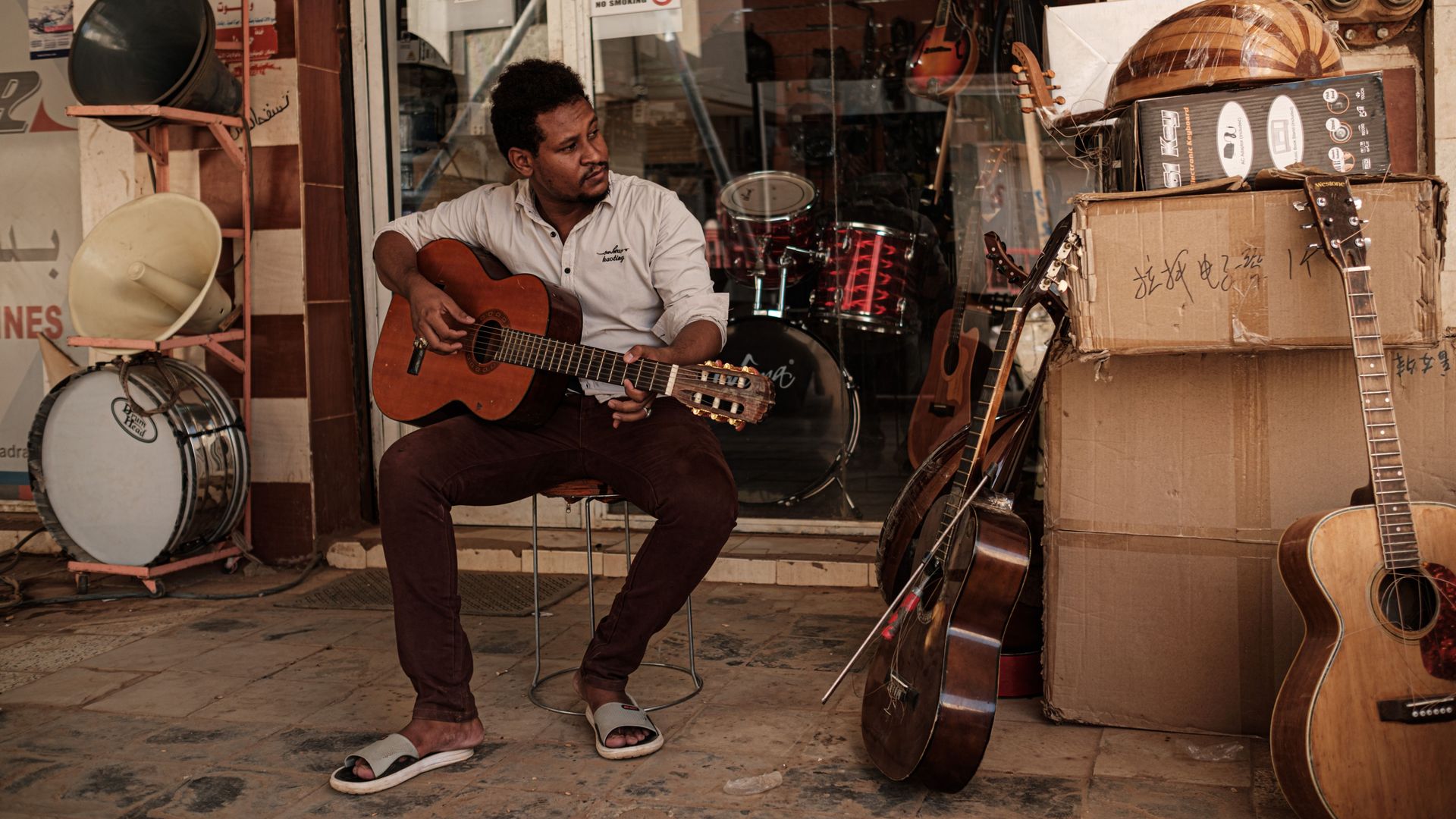 | | | Strumming a guitar in Khartoum. Photo: Yasuyoshi Chiba/AFP via Getty | | | | The Kamanga Kings jazz ensemble had faded into legend, its members aging or dead, by the time a letter arrived in Khartoum, Sudan, inviting them to play at the Kennedy Center in Washington. - The band will have to be reborn to take a belated turn in the spotlight — representing a country Americans only know for its suffering (if at all) in a country the Kings know only from records and films.
- It's a wonderful premise for a novel, and Jamal Mahjoub tidily concludes its arc in the first half of "The Fugitives."
- From there the plot twists and turns wildly and the British-Sudanese author sometimes abandons it to reflect on identity, freedom, immigration, xenophobia, America and Sudan.
I found the book occasionally irritating but often profound. And if the Kamanga Kings really were coming to town, I'd certainly buy a ticket. |     | | | | | | 7. Stories we're watching | 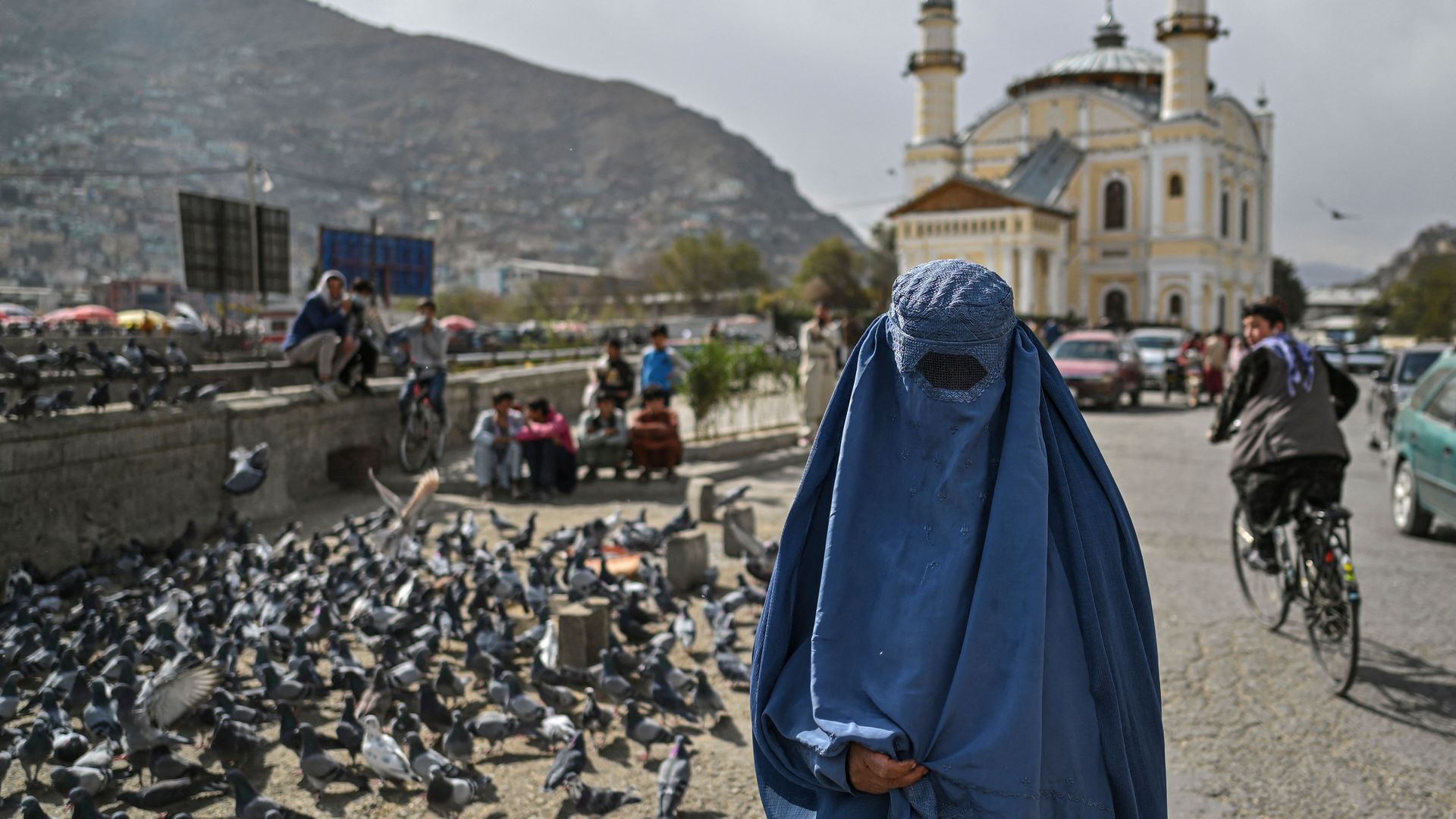 | | | Walking in Kabul. Photo: Hector Retamal/AFP via Getty | | | - G20 leaders endorse global minimum tax
- Biden G20 talks: supply chain issues; missiles with Erdoğan; submarines with Macron; vaccines with Tshisekedi
- Biden huddles with European leaders on Iran deal
- Watchdog: State + Pentagon withholding Afghanistan intel
- Gitmo prisoner shares account of CIA torture
- Mexico to give visas to some in migrant caravan
- U.S. + EU reach steel and aluminum deal
Quoted: "Deep down, I knew that the texts contained half-truths. But as a newsreader, you had to convince yourself it was the complete truth. And I did. I persuaded myself that we really were building communism. That life really would get better. Any doubts I had I managed to overcome. If I hadn't, then I wouldn't have been able to do my job." — Igor Kirillov, the Soviet Union's longtime leading news anchor, who died at 89. |     | | | | | | A message from Babbel | | Practice speaking a new language with Babbel Live | | |  | | | | Take live online classes with top certified, world-class language teachers and learn real world conversation skills quickly. Choose topics, level, and class time. Get 65% off and start on your shortest path to real conversations with Babbel Live. | | | | Answers: Cairo (1), Khartoum (2), Addis Ababa (3), Nairobi (4), Dar es Salaam (5), Johannesburg (6). |  | | It'll help you deliver employee communications more effectively. | | | | | | Axios thanks our partners for supporting our newsletters. If you're interested in advertising, learn more here.
Sponsorship has no influence on editorial content. Axios, 3100 Clarendon Blvd, Suite 1300, Arlington VA 22201 | | | You received this email because you signed up for newsletters from Axios.
Change your preferences or unsubscribe here. | | | Was this email forwarded to you?
Sign up now to get Axios in your inbox. | | | | Follow Axios on social media:    | | | | | |
No comments:
Post a Comment